The PhotoDrama of Creation
Section
7
Not
Dead But Sleepeth
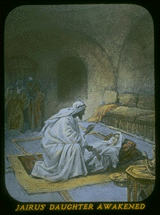
When
Jesus found the mourners bewailing the death of Jairus'
daughter, He put them forth, saying, "The maid
is not dead, but sleepeth." Then He awakened her.
Man does not die the same as beast. Although death to
man and beast is cessation of life, yet to man God has
given precious promises of a future life by a resurrection.
There are numerous assurances that mankind shall be
restored from death to receive things promised. Therefore
the Scriptures speak of man as not dying, but merely
falling asleep. The unconscious sleepers are all promised
an awakening in the Resurrection Morn. Jesus declared
that all in their graves shall hear His voice and come
forth--some to a life of eternal reward, for present
faithfulness; others to a trial, or judgment, to determine
their everlasting destiny.--John 5:28,29 R.V.
Jesus
awakened Lazarus, whose sisters were Martha and Mary,
at whose home He frequently stopped at Bethany. When
Lazarus was seriously sick, the sisters sent Jesus the
message, "Lord, he whom Thou lovest is sick."
To their surprise he allowed Lazarus to die. Mentioning
the matter to His disciples, He said, "Our friend
Lazarus sleepeth," and later, "Jesus said
unto them plainly, Lazarus is dead." Jesus said
not a word about the dead going to Heaven, purgatory
or hell, as was once believed. See John 3:13;11:13,14;
Acts 2:29-35.
This
word sleep has long been used as symbolical of death.
"Abraham slept with his fathers," and his
fathers were heathens. St. Paul refers to "those
who sleep in Jesus," and tells us "We shall
not all sleep," referring to those who remain alive
until the establishment of Messiah's Kingdom, and the
First Resurrection--at the beginning of His Reign.
These
sleep neither in Heaven, purgatory nor a hell of torment.
The Bible declares, "They that sleep in the dust
of the earth shall awake," some to shine as stars,
and others to be in contempt and shame, until they have
demonstrated their repentance and loyalty.--Daniel 12:2.
Capernaum
"Cast
Down to Hell"
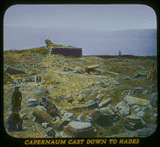
Capernaum,
the scene of the majority of Jesus' mighty works, is
now marked merely by a ruin. In it we see fulfilled
Jesus' prophecy, "Thou, Capernaum, which art exalted
to heaven, shalt be brought down to hell"-- to
Hades--the tomb. Symbolically that city was lifted to
heaven in privilege as being the Master's own city during
His ministry. Its great privileges meant great responsibility,
and hence Jesus told them that if the same mighty works
done in their midst had been done in Sodom and Gomorrah,
they would have repented. He said, "In the Day
of Judgment, it will be more tolerable for Sodom and
Gomorrah than for you."
The
Day of Judgment is undoubtedly the thousand-year Day
of Christ's Reign, in which judgment, or trial, will
be granted to the world, to separate "sheep"
from "goats"-- to determine those worthy and
those unworthy of everlasting life. That glorious Epoch
will be a blessed Day of privilege, light and grace,
in which all the darkness of sin will vanish. It will
be "more tolerable" for those who sinned without
light than for those who enjoyed great privileges and
opportunities.
Bible
students are coming to see that the Day of Judgment
has been greatly misunderstood. It has been thought
of as a time of condemnation, instead of which it will
be a period of testing, to see who, under trial, will
be found worthy and who unworthy of everlasting life,
which Jesus died to secure for all of Adam's race desiring
it on God's terms.
The
first Judgment Day was in Eden. Father Adam because
of disobedience was sentenced to death. For six thousand
years his race has been under that sentence. Jesus died
to release all from that sentence, and to grant to all
an opportunity of everlasting life. Only a faithful
few, an Elect class, have yet been blessed. Their judgment,
or trial, is in advance of the world, that they may
be with Jesus judges of the world during the world's
trial, or Judgment Day--the thousand years.--1 Corinthians
6:2; Acts 17:31.
Sheep
and Goats Parable
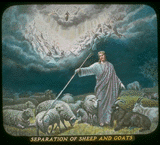
This
parable pictures the Kingdom conditions after the Church
is glorified and the Kingdom established. It will begin
fulfilment "When the Son of Man shall come in His
glory, and all the holy angels with Him." All nations,
including those now asleep in death, will be on trial
before Christ's Judgment Seat, to determine their willingness
or unwillingness to come fully into harmony with God,
and to receive the Divine blessing of life everlasting,
or, contrariwise, to be destroyed in the Second Death.
Those
developing the wayward, goat-like disposition will pass
to Messiah's disfavor, represented by His left hand.
At the close of the Millennium, the separation will
have affected the entire human family, and have brought
all into one of two classes. One class will be rewarded
with "the gift of God, eternal life." The
other class, unworthy, will get the punishment which
God has provided, namely, destruction--kolasin, cutting
off from life. "The soul that sinneth, it shall
die."
Their
destruction is symbolically represented by fire, and
was illustrated by the fires in the Valley of Hinnom
(mistranslated "Hell"), in which the garbage
of Jerusalem was destroyed. The Valley of Hinnom (Greek,
Gehenna) was once quite deep. Only dead carcasses were
put into it, including those of very vicious criminals.
It symbolized hopelessness--annihilation. Jesus used
Jerusalem as a figure of the New Jerusalem. This valley--Gehenna--prefigured
the Second Death, from which there will be no redemption--no
recovery.
Gehenna
was earlier called Tophet. When Israel became idolatrous,
the image of Moloch was erected there and children were
roasted alive in the arms of the image--sacrifically--
devilishly. Good King Josiah defiled it for garbage
purposes.
Our
pious fathers provided worse idols for us--Creed-idols!
To these we were taught to sacrifice millions of heathens,
and non-elect infants. But their day is gone! Thank
God! Saner views of God are ours, and a truer interpretation
of the Bible.
Kingdom
Work Illustrated
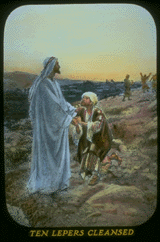
Not
only did Jesus and His disciples preach about the Kingdom,
and teach about it in parables, but the mighty works
which Jesus did were intended to foreshadow the still
greater work to be accomplished by His Kingdom during
His Millennial Reign.--Matt.4:23; Isa. 35:5,6.
This
is intimated by the words, "These things did Jesus
and manifested forth His glory." In other words,
the works of Jesus were foregleams of the work of His
Glorious Kingdom. Many of His mighty works were done
on the Sabbath for the same reason. As the six days
in the week represent toil and travail, the result of
sin, so the seventh day represents the Millennium, "the
rest of the people of God," secured to all who
accept it through the merit of Christ's sacrifice.
The
turning of water into wine represented how the plain
things of the present time, the simplicity of present
Truth, will yet be transmuted by the Lord into the joys
of the Kingdom, at the Marriage Feast in glory.
The
cleansing of the lepers represented cleansing from the
leprosy of sin. The one who returned to give glory to
God represents the fact that only a "little flock"
appreciate the favor of sins forgiven during this Age.
The
healing of the sick represented the great fact that
all diseases (mental, moral, physical) will be healed
by Messiah, the "Good Physician," Royal Priest,
typed by Melchisedec.
The
opening of the blind eyes and of the deaf ears represented
the greater fact that in due time the eyes and ears
of understanding of all mankind will be opened, and
God's glory will be appreciated. "All flesh shall
see it together."--Isa.40:5.
Our
Lord's Transfiguration on the Mount was another illustration
of the Kingdom. His disciples knew not whether it was
a reality or a vision, until Jesus said, "Tell
the vision to no man until The Son of Man be risen from
the dead." Later, St.Peter declared that what they
saw in the holy mount represented Messiah's Kingdom.--2
Peter 1:16-18.
Hosanna
in the Highest
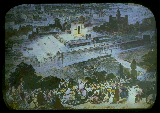
Toward
the close of Jesus' Ministry He came to Bethany, to
the home of Lazarus, Martha and Mary-- the same Lazarus
whom He had awakened from the sleep of death. Mary chose
this opportunity to anoint the Master's feet with Precious
Ointment, which He declared was an anointing for His
burial.--Matthew 26:12.
The
next day He sent for an ass and rode thereon into Jerusalem,
after the manner of Israel's kings. When Jesus came
in sight of Jerusalem, He wept over the city, exclaiming,
"O Jerusalem, Jerusalem, which killest the Prophets,
and stonest them that are sent unto thee, how often
would I have gathered thy children as a hen gathereth
her brood under her wings, but ye would not! Now, I
say unto you, Your house is left unto you desolate!
Ye shall see Me no more until that day [of Messiah's
glory] when ye shall say, 'Blessed is He that cometh
in the name of the Lord!'" (Matthew 23:37-39.)
Meantime the Kingdom is not abandoned, merely delayed.
Messiah's Bride will be only partly Jewish. "Israel
hath not obtained" the coveted chief favor; but
the Elect obtained it.
The
multitude caught the spirit of the occasion, that Jesus
was the promised King, and hailed Him as Messiah. They
scattered clothing and palm-branches before Him, implying
that the best of Earth was not too good for One so great.
Meantime, they shouted, "Hosanna to the Son of
David!" The long-promised Messiah of David's line!
"Blessed is He that cometh in the name of Jehovah!"--Matthew
21:9.
The
Pharisees, who did not believe, thought the procedure
sacrilegious, and told Jesus to stop the shouting. Jesus
replied that the Prophet Zechariah (9:9) said, "Shout,"
and therefore there must be a shout. "If they should
hold their peace, the very stones would cry out."
God had declared it; there must be a shout; the prophecy
must be fulfilled.
Cleansing
the Temple of money-changers and merchants followed
our Lord's triumphal entry into the city.
The
Cost of the Kingdom
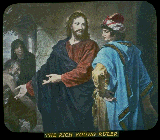
The
Bible surely tells us that the way to the Kingdom is
difficult and narrow, that the cost of being disciples
of Jesus is self-denial and cross-bearing. Many wonder
that the promises are thus restricted and not to all
who strive to do right, without faith or self-sacrifice.
The
parable of a camel creeping through a Needle's-eye illustrated
how the rich must unload their wealth if they would
prepare to share the Kingdom. The little gate in the
larger one was called a "Needle's-eye."
Bible
students now explain that difficulties are attached
to the gaining of the Kingdom because God desires a
very choice little company for that glorious position.
He has made the trials so severe that only the saintly
will avail themselves of the opportunity to gain the
Kingdom.
The
young ruler asked Jesus: "What shall I do to inherit
eternal life?" Jesus referred him to the Law, which
promised eternal life to any Jew who would keep it.
The young man replied that he had done his best, but
still was dying. Jesus loved him for his good endeavors,
and pointed him to a new way to life everlasting, by
self-sacrifice as His disciple. Additionally he might
become a joint-heir with Jesus in glory, honor and immortality.--Mark
10:17-25; Romans 2:7;8:17.
Two
dear disciples asked to sit next Jesus on the Throne
of His Kingdom. The Master replied, Are you able [willing]
to drink of My cup of self-denial, self-sacrifice, ignominy
and shame? Are you able to be baptized into My death--to
self- will, to cutting off from every earthly privilege,
if such be God's providence for you?--Matthew 20:22;
Mark 10:35-38.
Those
loving disciples answered that they were ready for anything,
with the Master's help. He assured them and us that
He will furnish trials and assistances, and that if
faithful to the end, we shall have a crown of life.
But the honors and glories of the Kingdom will not be
determined by grace, but by Justice.--Matthew 20:23;
Revelation 3:21;2:10.
The
Memorial Supper
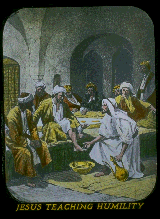
Five
days after Jesus rode on the ass, offering Himself as
Israel's King, came the Passover, typical of the passing
over of the Church of the First-borns.
Jesus
was the Lamb of God to take away the sin of the world.
In order to do this, He must be the Passover Lamb. St.
Paul says, "Christ our Passover is slain, therefore
let us keep the feast." Jesus ate the typical Passover
lamb with His disciples. Then He took unleavened bread,
and fruit of the vine, as representing His own flesh
and His own blood, and instituted an antitypical Passover
Supper.
Jesus'
followers were to do this in remembrance of His death
as the antitypical Lamb. He said, "Except ye eat
the flesh and drink the blood of The Son of Man, ye
have no life in you." Of course, the outward performance
would be nothing except as it would symbolize heart
experiences. In their hearts, Jesus' followers must
realize that His death is the Ransom- price for the
sins of the whole world; that without it there would
be no everlasting life. Such believers constitute the
Church of the First-borns, who pass into life in advance
of the world--in the First Resurrection.--Revelation
20:6.
St.Paul
shows a still deeper meaning to the Memorial Supper.
All the followers of Jesus are represented in the One
Loaf that is being broken, and as sharing in the One
Cup of suffering, shame, ignominy and death. (1 Cor.
10:16,17.) Only such will be members of His glorious
"Body," the world's "Prophet like unto
Moses."--Acts 3:19-23.
The
disciples neglected to wash each other's feet or even
the Master's. Jesus performed the service as a lesson
in humility-- not as a ceremonial. The spirit of the
lesson is that we render each other any service possible,
as "members" of Christ.--Acts 9:5; 1 Corinthians
12:27.
After
the Supper, Jesus with the Eleven went to Gethsemane,
where Judas betrayed Him to the officials with a kiss.
Then followed the memorable closing scenes of our Lord's
life.
"Ecco
Homo!"--Behold the Man!
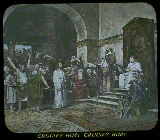
Early
the next morning Jesus was led to Pilate and charged
with Treason against the Emperor in asserting Himself
a King. His accusers were the foremost Jews. Pilate
realized the malice of the charge, to secure the death
of an inoffensive person. Learning that Jesus was from
Galilee, he sought to rid himself of the responsibility
by sending Him to King Herod. But Herod would have nothing
to do with Jesus. He had heard of His miracles, and
feared. After Herod's soldiers had mocked Jesus, He
was returned to Pilate. His accusers insisted that if
Pilate should let Him go, that would prove disloyalty
to the Roman Emperor.
Pilate
sought to release Jesus, and to satisfy the clamor,
ordered Him to be scourged. But this did not satisfy
the mob, which cried, "Crucify Him!" Finally,
Pilate, placing Jesus prominently, exclaimed, "Ecce
Homo!"--Behold the Man! You have no other Jew His
equal! Would you crucify Him? The mob cried the more
persistently, "Crucify Him!" Nothing is more
heart-hardening than religious errors.
Jesus
was not the mob's ideal of a king. Had He been coarse,
vulgar, a boaster, He would have been more nearly their
ideal of a person likely to lift their nation from under
the Roman yoke, and to become conqueror, like Alexander
the Great. The world looks with a measure of reverence
upon Jesus, but still He is far from the human ideal.
Neither are the footstep followers of Jesus the world's
ideals. They with Jesus are counted peculiar. As St.
John wrote, "As He is, so are we, in this world"--despised
as respects human ideals.
Humanity
fails to realize that God's purpose in Christ and His
followers has been to prepare them by meekness, gentleness,
patience, long-suffering and love for the glorious work
of Messiah's Kingdom, to bless all mankind. Present
experiences are necessary, the Bible declares, that
this Royal Priesthood may be, later on, a sympathetic
Priesthood in respect to mankind.--Hebrews 2:10;3:1;5:8-10;12:11.
The
Dying Thief's Hope
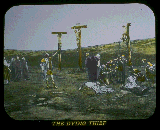
Pilate
washed his hands in the sight of the people as expressing
his innocence of Jesus' death; then he gave the necessary
orders for the execution. The Roman Government expected
him to be absolutely just in respect to Roman citizens;
dealings with others were to be conciliatory.
Two
thieves were crucified at the same time, one on either
side of Jesus, over whose head was charged the crime
for which He was crucified: "Jesus, the King of
the Jews." Few deaths are so painful as crucifixion.--Matthew
27:37.
One
thief made sport of Jesus, saying, If you are God's
Son, the Messiah and King, prove it by coming down from
the cross. If Jesus had saved His life, He could not
have become the King and Savior of the world, because
only by His death could the Death Sentence against Adam
and his race be met. Jesus died willingly a sacrificial
death.
The
other thief defended Jesus, saying that He had done
nothing amiss, whereas they were receiving a just penalty.
After
this defense the penitent thief turned to Jesus, saying,
Lord, if You are a King and ever come into Your Kingdom,
remember this poor thief--do something for me! Jesus
replied, Amen! i.e., So be it--as you ask! Although
I seem to have not a friend in Heaven or Earth, yet
I say unto you this dark day, You shall be with Me in
Paradise. My Kingdom will be established. Under its
influence Earth will become a Paradise. You shall be
rewarded there.
The
misplacement of the comma in our common English Version
has thrown us all astray. Evidently Jesus did not go
to Paradise that day, because Paradise is not yet established.
Furthermore, three days after, when He arose from the
dead, He said to Mary, "I have not yet ascended
unto My Father." St.Peter tells us that He was
dead and that His soul was raised from the dead on the
third day. (Acts 2:31.) "All people" are to
be blessed by Messiah's Kingdom, but penitence prepares
for quicker blessings and fewer "stripes."
"Quickened
in Spirit"
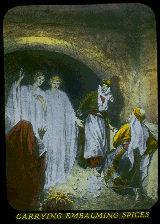
Because
still natural men, the disciples could not comprehend
spiritual things--until Pentecost. It was necessary,
therefore, that Jesus' resurrection should be humanly
demonstrated. Only believers could receive the Pentecostal
illumination. They must believe, and know also that
He is no longer a man, but again a spirit being.
The
third day after Calvary the women who carried embalming
spices found the sepulchre empty. Mary met Jesus, but
knew Him not, for He appeared as a gardener. Jesus revealed
Himself by His voice. He said, "I have not yet
ascended to My Father and your Father, to My God and
your God." The news spread. St. Peter and St. John
were amazed, and both ran to the sepulchre. They saw
nothing but the vacant tomb and the folded clothes.
Later
the same day, two of them journeyed to Emmaus. They
were conversing eagerly when Jesus, in another form,
unrecognized by them, joined them. He quietly explained
to them the types and prophecies which foretold Jesus'
death as man's Redeemer, saying, "Thus it behooved
Messiah to suffer and to enter into His glory."
Telling the experience afterward they said, "Did
not our hearts burn within us as He talked with us by
the way and opened unto us the Scriptures?" At
their evening meal, He revealed Himself, and vanished.
The
same evening many of them were gathered in the upper
room discussing the remarkable events of the day, the
doors being shut, yea, bolted, for fear of the Jews.
Suddenly while the doors were still shut, Jesus appeared
in their midst, still differently. This time He appeared
like His former self. Even this affrighted them, though
He told them that what they saw was flesh and blood,
and proved it by eating. He was no longer the fleshly
Jesus; in His resurrection He returned to the spirit
condition. (1 Corinthians 15:44.) But, He had power
to materialize, as the holy angels (and Himself, before
made flesh) had done.
